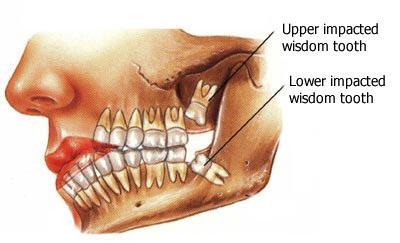Should I Get My Wisdom Taken Out? Wisdom Teeth Removal Cost And Benefits

Are you considering getting your wisdom teeth removed? It’s a big decision! Removing your wisdom teeth could bring relief from any pain or discomfort they’re causing, but it could also come with risks and costs.
You’ll want to weigh the potential risks and benefits before you make your decision. In this article, you’ll learn about the potential risks and benefits of wisdom teeth removal, the average cost, the recovery time, alternatives, and how to prepare for the procedure.
With this information, you can make an informed decision about whether to get your wisdom teeth taken out.
What are Wisdom Teeth?
You have those hard-to-reach molars in the back of your mouth that are often called “wisdom teeth”. These teeth are usually the last to emerge, typically erupting between the ages of 17 and 25.
Wisdom teeth are the third and final set of molars that most people get in their late teens or early twenties. They’re so-called because they appear at a time in life when people are considered to be wiser.
Wisdom teeth can cause a variety of problems if they don’t come in correctly. They may be impacted, meaning they’re blocked by other teeth, or they may grow in at an angle, pushing against other teeth and causing them to shift. If this happens, it can cause pain and discomfort, and it can lead to other oral health problems.
That’s why many people opt to have their wisdom teeth removed to prevent potential problems.
What are the Potential Risks of Wisdom Teeth Removal?
It’s important to understand the potential risks associated with wisdom teeth removal so you can make an informed decision.
In general, wisdom teeth removal is a safe procedure with minimal risks. However, complications can arise, such as infection, nerve damage, damage to nearby teeth, and excessive bleeding. These risks can be minimized by having the procedure done by an experienced dentist or oral surgeon.
In addition, there is a risk of dry socket, which is a condition in which a blood clot fails to form in the socket after the tooth has been removed. This can be extremely painful and can lead to infection.
It is important to follow your dentist’s post-operative instructions carefully and attend all follow-up appointments to reduce the risk of dry socket.
By being aware of the potential risks associated with wisdom teeth removal, you can make an informed decision about whether or not to proceed.
What are the Potential Benefits of Wisdom Teeth Removal?
Removing your wisdom teeth can have many potential benefits for your oral health. It can prevent crowding of other teeth and misalignment of the jaw, making it easier to keep the remaining teeth clean and healthy. Additionally, it can help reduce the risk of cavities, tooth decay, and gum disease.
One of the most immediate benefits of wisdom teeth removal is a reduction in discomfort, pain, and swelling that often accompany the eruption of wisdom teeth. After the removal of wisdom teeth, you may experience a decrease in headaches and an overall feeling of discomfort.
Overall, removing wisdom teeth can also reduce the risk of infection and other complications caused by impacted wisdom teeth. So, if you’re experiencing any discomfort or pain related to your wisdom teeth, it may be time to consider having them removed.
What is the Average Cost of Wisdom Teeth Removal?
The cost of wisdom teeth removal can vary widely depending on the individual, but typically ranges from $150 to $650 per tooth.
The total cost of the removal depends on the number of teeth being removed, the complexity of the procedure, and the type of anesthesia used.
In most cases, the cost is covered by insurance, although some plans may require you to pay the full cost up front and submit a claim for reimbursement.
In some cases, the cost may be reduced if the dentist or oral surgeon offers a discounted rate or payment plan.
Additionally, many dentists and oral surgeons offer financing plans to help cover the cost of the procedure.
It’s important to remember that the cost of wisdom teeth removal is typically much less than the cost of treating a dental emergency or other serious dental health issues that can arise when wisdom teeth are not removed.
Therefore, it may be wise to consider the long-term cost savings when deciding whether or not to have your wisdom teeth removed.
What is the Recovery Time After Wisdom Teeth Removal?
After having your wisdom teeth removed, you can expect a recovery period of several days to a few weeks. This is due to the type of surgery which is needed to remove the teeth, as it can be a complicated and invasive procedure.
Depending on the number of teeth that need to be removed, as well as the difficulty of the surgery, the recovery time can vary. Generally, you can expect to be able to return to your normal activities within a week, although it may take up to two weeks to fully recover.
During the recovery period, it’s important to take it easy and rest, as well as follow any instructions from your dentist or surgeon. This may include taking medications, eating a soft food diet, and avoiding strenuous activities. It’s also important to monitor any pain or swelling that may occur and contact your dentist if any problems arise.
By following these instructions, you can ensure a safe and successful recovery.
What are the Alternatives to Wisdom Teeth Removal?
Recovery time after wisdom teeth removal can be a concern for many people considering the procedure, but it’s important to note that there are other options available.
If you’re considering wisdom teeth removal but you’re unsure if it’s right for you, you may want to consider the alternatives. In addition to reducing recovery time, these alternatives may help you avoid the potential risks associated with wisdom teeth removal.
The most common alternative to wisdom teeth removal is the use of orthodontic braces. Braces can be used to move the teeth and create more room in the mouth, which can help to prevent the need for wisdom teeth removal. This option is often more affordable and may be better for those who don’t want to undergo surgery.
Another option is the use of dental crowns or bridges. Crowns and bridges can be used to close gaps in the mouth and provide the same protection as wisdom teeth removal.
Finally, if your wisdom teeth aren’t causing any problems, your dentist may recommend leaving them in place. This is the most conservative option and can help you avoid the potential risks associated with wisdom teeth removal.
How Do I Prepare for Wisdom Teeth Removal?
Worried about wisdom teeth removal? Learn how to prepare for the procedure and get the most out of it with minimal recovery time. Before your appointment, it’s important to understand the procedure and what will be required of you.
To prepare for your wisdom teeth removal, here are three key steps:
- Make sure to get a full evaluation of your wisdom teeth. This includes taking x-rays before your appointment so that your dentist or oral surgeon can determine what type of extraction is necessary for your particular teeth.
- Talk to your dentist or oral surgeon about any medications you may be taking. It’s important to provide a full list of medications, both prescription and over-the-counter, so that they can determine if any of them will interfere with the procedure.
- Follow any instructions you are given for the day of your procedure. These may include fasting for 12 hours prior to the procedure, and avoiding certain foods and drinks after the procedure. It’s important to follow these instructions closely in order to ensure a successful extraction and recovery.
By following these steps, you can ensure that you’re fully prepared for your wisdom teeth removal procedure. This will help you get the most out of the procedure with minimal recovery time.
How Do I Make an Informed Decision?
If you’re considering wisdom teeth removal, it’s important to make an informed decision. To do this, it’s important to understand the risks and benefits of the procedure.
Research each of the potential risks and benefits associated with the procedure, and talk to a health care provider about their opinion. Ask the health care provider what their experience has been with wisdom teeth removal, and what the most common outcomes are. Additionally, be sure to ask about the potential costs associated with the procedure, as well as any payment plans that may be available.
It’s also important to ask about any alternatives that may be available. Some wisdom teeth may not need to be removed if they’re not causing any pain or discomfort. If the wisdom teeth are causing pain or other issues, there may be other non-surgical treatments available. Ask your health care provider about any non-surgical alternatives that may be available for your wisdom teeth.
Be sure to weigh the risks and benefits of the procedure before making your decision.
Conclusion
You’ve weighed the pros and cons of wisdom teeth removal, and it’s time to make a decision. As you assess your individual situation, remember that the average cost of wisdom teeth removal is between $200-$600 per tooth.
Make sure to consult with your dentist and factor in any potential risks before making your decision. Ultimately, it’s up to you to decide if you should get your wisdom teeth removed or not.
Don’t be afraid to ask questions and get a second opinion if needed. It’s important to make an informed decision that’s best for your health and wallet.









